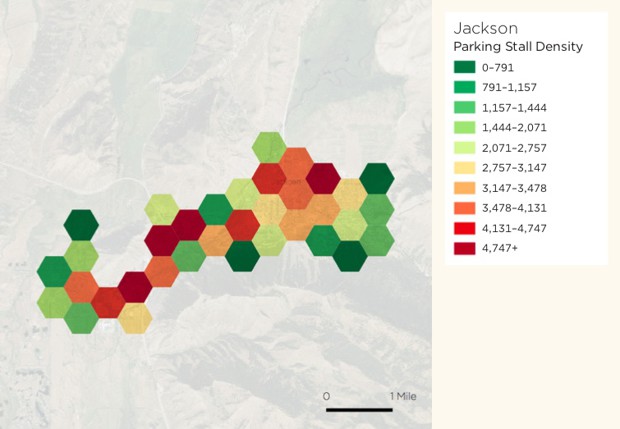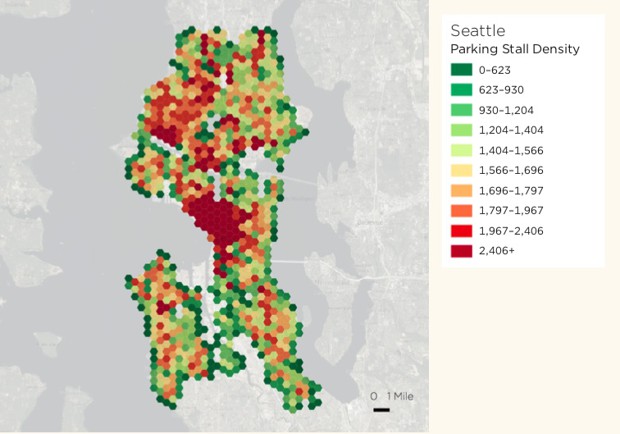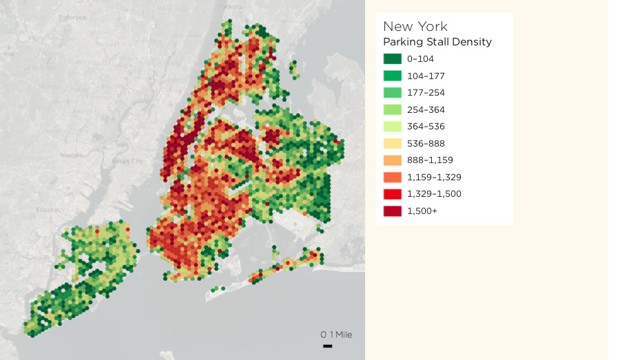Parking Has Eaten American Cities

A new study documents the huge amount of space taken up by parking, and the astronomical costs it represents, in five U.S. cities.
Parking eats up an incredible amount of space and costs America’s cities an extraordinary amount of money. That’s the main takeaway of a new study that looks in detail at parking in five U.S. cities: New York, Philadelphia, Seattle, Des Moines, and Jackson, Wyoming.
The study, by Eric Scharnhorst of the Research Institute for Housing America (which is affiliated with the Mortgage Bankers of America), uses data from satellite images, the U.S. Census, property tax assessment offices, city departments of transportation, parking authorities, and geospatial maps like Google Maps to generate inventories of parking for these five cities. (The inventories include on-street parking spaces, off-street surface parking lots, and off-street parking structures.)
It not only estimates the total number of parking spaces in these cities and their overall estimated replacement costs, but develops interesting metrics such as parking spaces per acre, parking spaces per household, and parking costs per household—as well as providing maps of parking densities across these cities.
In sum, it provides additional empirical confirmation for parking guru Donald Shoup’s idea that American cities devote far too much space and far too many resources to parking.
Scharnhorst finds that there are more than 2 million parking spaces in Philadelphia, 1.85 million in New York, 1.6 million each in Seattle and Des Moines, and just over 100,000 in tiny Jackson, which has a population of about 10,000.
Parking takes up a huge amount of space: Jackson has more than 50 parking spaces per acre, 25 times its residential density of just two households per acre. Jackson has a whopping 27 parking spaces for each of its households.
Des Moines has nearly 30 parking spaces per acre, roughly 20 times its residential density (1.5 households per acre). Seattle also has roughly 30 parking spaces per acre, more than five times its residential density (5.7 households per acre). So there are more than 5 parking spaces for every household in Seattle.
Philadelphia has 25 parking spaces per acre, almost four times the city’s household density of 6.8 per acre. New York is the only city in the study that has fewer parking spaces per acre than households: 10 spaces compared to 16 households. That works out to slightly more than half a parking space (0.6) for each household. (New York also has the highest share of transit commuters in the U.S.)
Parking also sucks up a lot of resources in the five cities. Measured in terms of replacement, it costs more than $35 billion in Seattle, $20 billion in New York, $17.5 billion in Philadelphia, $6 billion in Des Moines, and $711 million in Jackson.
These figures are more staggering when tallied in per-household terms. Parking eats up almost $200,000 per household in Jackson, more than $100,000 in Seattle, and over $75,000 in Des Moines. It is a bit less in Philadelphia and New York: roughly $30,000 in Philly, and a meager $6,570 in New York.



Comments
Post a Comment